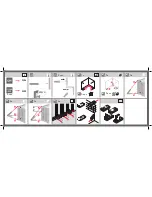
3-83
Laser Address Selection
The four point automatic mode is a more traditional style of acquiring data for
alignment. The laser heads are mounted on a shaft, and the shaft is then rotated so
that data can be taken when the laser heads are at the 12 o’clock (0 or 360°), 3
o’clock (90°), 6 o’clock (180°), and 9 o’clock (270°) positions. The readings are
continuously averaged whenever the laser heads are at one of these positions and
automatically recorded when the shaft is rotated to the next position. The aver-
aging process reduces variation from jitter due to background vibration or from
slight changes in the angular position of the heads. Refer to the Auto 4 Point sec-
tion on page 3-100 for more information.
•
Manual 4 Point
Similar to the Auto 4 Point mode except that the user has complete control over
when data is acquired and which of the four measurement positions it will be used
in. This method is useful when the machinery is not mounted in a true horizontal
orientation, so that the inclinometer is not effective or when the clock positions rel-
ative to vertical and horizontal base movements of the machine are nonstandard.
Refer to the Manual 4 Point section on page 3-105 for more information.
•
Dual Pass
Functions similar to the Auto Sweep mode except data is automatically acquired as
each laser head passes by each other. This method, like Manual Sweep, is useful for
performing uncoupled or non-rotational alignments. Refer to the Dual Pass sec-
tion on page 3-119 for more information.
4 Point Methods - General Information
There are two fundamental methods by which the data is acquired for shaft align-
ment calculations: the 4 point modes and the sweep modes. The 4 point modes
require data to be taken at positions perpendicular and parallel to the axis in which
the machine's horizontal position can be adjusted. This is sometimes called the
clock method and most often uses data readings at 12 o'clock (0 or 360°), at 3
o'clock (90°), at 6 o'clock (180°), and at 9 o'clock (270°). This is typical of the data
acquired by those trained in using a scaled graph to manually arrive at an align-
ment solution using the reverse dial indicator method.
Summary of Contents for 2130 RBM Consultant Pro
Page 6: ...vi ...
Page 20: ...1 8 Fixtures Case Layout top section ...
Page 90: ...3 10 Horizontal Alignment ...
Page 364: ...5 22 Straightness Measurements ...
















































